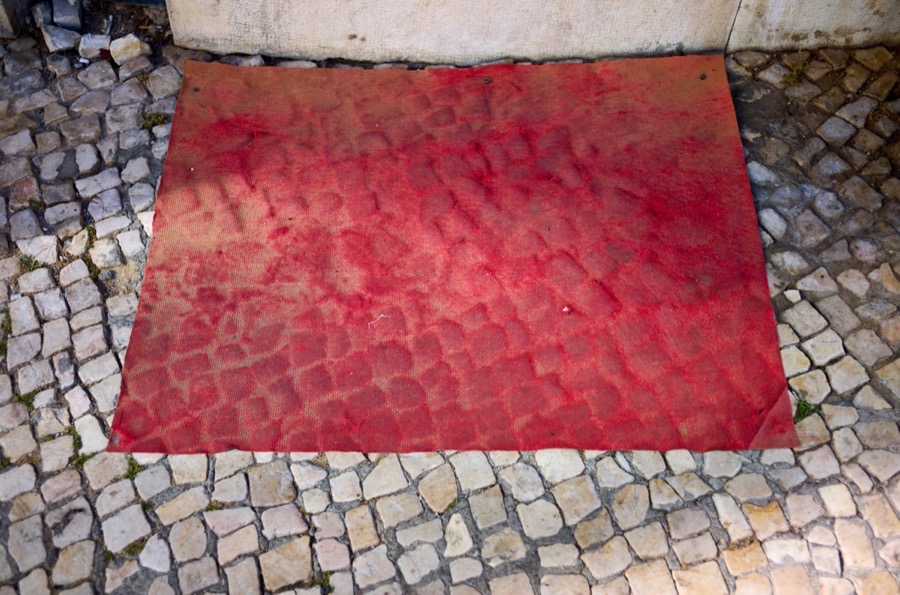02023-07-11 | Book, Lx, Photos, Walking
Hers was a walking discipline, like the practices of the peripatetic dervishes. It proceeded at the speed of footsteps, which is the speed of history, and at that speed, on those long walks which are the science’s method, connections and correspondences appear. Strange symmetries appear between separated buildings as if some urban continental drift has taken place. Streets follow ancient, atavistic needs.
from The Dervish House by Ian McDonald
Of course I am going to love that… 😄
Connections and correspondences indeed appear at the speed of footsteps. Anything faster than footsteps and we might miss this door mat, so thin that it looks like a red filter hovering above the stones. Everything lines up and it is clear that the mat has not been moved in a very long time.
I think I should put together a slideshow that contains only the most basic and mundane subject matter. No grand vista, nothing amazing… just simple things that caught my eye.

02023-05-17 | Walking
Why does walking help us think? For me:
1. It’s a self-hypnosis. The steady beat of your feet on the ground, the beat of the world moving past.
2. It pulls your stinkin’ noggin’ out of your stinkin’ phone. Mostly, anyway. In this way, it forces you to be present, to sometimes — even — be bored.
3. Boredom is the source of many solutions. Boredom kicks the brain into processing mode — background or otherwise.
So: We’re hypnotized through movement. We’re present. And we’re bored. That’s why it’s so good.
Drumming is a Kind of Walking — Ridgeline issue 162
I agree that rhythm is a big part of what makes walking so good for thinking. I also feel that walking is ingrained very deeply into our body and mind. It’s what humans have done forever. Walk to find food, walk to find prey, walk to water. At one point much of humanity walked out of Africa and all over the globe. There is comfort in putting one foot in front of the other.
Boredom is creative or rather, boredom leads to creativity.
Boredom is the empty bowl that can receive the tea. No empty bowl – no room for tea.
02023-02-16 | Walking
Our first questions about the value of a book, of a human being, or a musical composition are: Can they walk? Even more, can they dance?
– Friedrich Nietzsche
02023-01-08 | Touring, Walking
There are reasons for walking fast and for me they tend to involve temperature or hunger. I remember a few early mornings, when I stormed through Manhattan with Jon, on our way to a favorite cafe downtown. We would cover more than 60 blocks in very little time. Today, I figured my wool hoodie would be too warm and left the hotel in a t-shirt, when it was 54º outside. So I had to hustle and hustle I did. I covered 3.15 miles at an average pace of 14’24” per mile. Because a gaggle of humans was holding me up for a while, on the narrow river walk, I walked the third mile at a pace of 13’50”, which, for me, feels like the last gear before running.
I noticed several spots where either birds of paradise or banana plants had been cut down. What happened there, I wondered. Not enough rain? Too cold?



